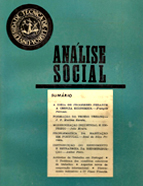

................................
This list of categories shows that Análise Social built its reputation as an academic journal interested in promoting a debate based on theoretical and empirical foundations across a wide field of research served by various social science disciplines, with an emphasis on economic and sociological studies. For this reason, Análise Social became a platform for knowledge and intervention, attracting the attention of a diverse range of readers that went beyond the limited number of people who were then cultivating the field of social sciences in Portugal. During this initial phase, the circulation of Análise Social varied between 2,000 and 3,000 copies, demonstrating the enormous potential for support for the informed reflection carried out by GIS researchers under the leadership of Adérito Sedas Nunes. Interestingly, the price of the journal remained unchanged between 1963 and 1974 (25 escudos for a single issue, 80 escudos for an annual subscription).
A salient aspect of the few historical studies produced during this period (1963-1974) is their connection with the themes on the GIS’s scientific agenda. In this regard, the special triple issue dedicated to “The University in Portuguese Life” (Vol. VI, No. 22/23/24, 1968) included three articles on the history of education, by António Farinha Portela, on the history of the teaching of economics in Portugal since the Pombaline School of Commerce, by Maria Eduarda Cruzeiro and Raul da Silva Pereira, which presented a historical chronology of Portuguese universities, and by Vitor Matias Ferreira and A. Sedas Nunes, on the Portuguese university environment between 1945 and 1967. Also on the theme of the (sociological) history of education were the works of Vitor Matias Ferreira, dedicated to the history of the Portuguese student press (Vol. VII, no. 25/26, 1969), and Maria Filomena Mónica on primary education in the early years of the Salazar regime (Vol. X, no. 39, 1973).
This work is financed by national funds through FCT - Foundation for Science and Technology, I.P, in the scope of the projects UIDB/04311/2020 and UIDP/04311/2020.
